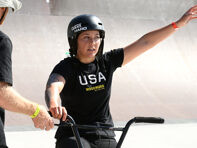The story surrounding British cycling athlete Emily Bridges has been contentious since the elite-level performer came out as transgender over two years ago.
Despite being ruled eligible to compete as a woman previously, Union Cycliste Internationale and British Cycling disqualified Bridges from a national championship event and effectively banned transgender women from competing in women’s cycling, due to a policy change currently under review.
Her journey was chronicled by a film crew from Britain’s ITV network since spring 2021. Now they are releasing a new documentary film titled Race To Be Me, which debuted on ITV Wales in the United Kingdom on November 29.
In a written statement posted on the air date, Bridges stated she wanted her story told in the hopes to educate above the controversy she has drawn.
“It was conceived to humanize what was going to become a highly discussed and debated story, and I hoped that it could also inspire and show young queer people that there is a place for them in sport,” she said. “I hope it can help shed some light around what’s really happened.”
📺🚴🏻♀️🏳️⚧️ On Tuesday 29 November, elite trans cyclist Emily Bridges’ documentary ‘Race To Be Mẹ’ will be aired on @ITVWales .
— PRiDE OUT (@PrideOutUK) November 24, 2022
It details her battle to represent Wales at the #CommonwealthGames, which found herself at the centre of an international storm. pic.twitter.com/SqenBgAbfT
The film looks at key points in her timeline, including the continuing uncertainty about her ineligibility with both the world and national governing bodies. It also documents personal highs and low as Bridges worked herself into competition shape, while also drawing fire from certain people in the press, and from Britain’s growing and vocal “gender critical” movement.
Some think the decision to keep Bridges out of the UK National Omnium Championships in April was due to fears over the possibilities of on-site protests like the ones instigated against swimmer Lia Thomas at the NCAA Division I Swimming and Diving Championships last March.
In November, British Cycling stated publicly that a new transgender inclusion policy will be published by spring 2023. Representative for the governing body told Cycling World magazine that they “remain committed to ensuring that trans and non-binary people are welcomed, supported and celebrated in the cycling community.”

While missing out on a chance to represent Wales at the Commonwealth Games last summer, Bridges keeps pedaling forward. She competed in a number of local events put together by inclusive cycling organizations, while continuing her push to make governing bodies open to change.
“I’m still here. Despite all this, I’m still here,” she asserted. “Despite everything, this has been the best year of my life. I’ve started racing in small-scale events again, in the correct category, with amazing people. It’s kept cycling alive for me, that inclusive community that I wish road and track cycling was and should strive to be.”





































